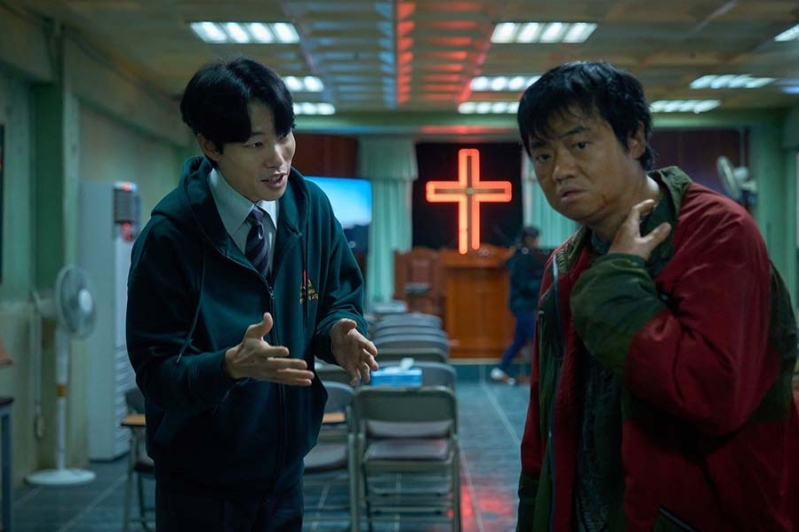
A man walks into church, seeking grace—but his past might be too much for even the most forgiving to bear.
One of the most pressing themes explored in the film Revelation is the question: How should the church treat sinners—especially those who are actual criminals? In the film, Seong Min-chan (played by Ryu Jun-yeol), a pastor of a small church plant, warmly welcomes a newcomer named Kwon Yang-rae (Shin Min-jae) into the congregation. He even encourages him to register as a new member. However, as Kwon prepares to leave, Seong notices an ankle monitor on his foot—revealing that he is a convicted sex offender being tracked by police.
Seong’s reaction captures what has become a prevailing sentiment in Korean Protestant churches today. “The church… is where sinners come,” he says with sincerity. Behind this conviction lies a noble belief: regardless of someone’s past, the church should welcome anyone who seeks it, without suspicion.
This attitude is deeply rooted in Scripture and church tradition. From the parable of the Prodigal Son (Luke 15:11–31) to Jesus’ proclamation that “the tax collectors and prostitutes are entering the kingdom of God ahead of you” (Matthew 21:31), Christian teaching consistently upholds the redemptive potential of even the most marginalized sinners.
Church history reinforces this as well. One prominent example is John Newton (1725–1807), the former slave trader turned Anglican priest who penned the hymn Amazing Grace after deeply repenting of his past and advocating for the abolition of slavery.
Literature and popular culture have long echoed this message. Perhaps the most iconic instance is Victor Hugo’s Les Misérables, in which Bishop Myriel forgives the thief Jean Valjean and sets him on a path of redemption—a powerful Christian image embraced by both Catholics and Protestants.
These examples suggest that the church should open its heart to anyone turning toward Christ, regardless of their past. But reality tells a more complicated story. There have been cases where such unconditional openness led to emotional or even physical harm to church members.
Revelation dramatizes one such scenario. Kwon did not enter the church to seek redemption—he came to abduct and abuse a young girl attending the congregation. This violent act leaves devastating consequences not only for the victim and her family but for Pastor Seong as well. Though he acted according to a commonly held Christian ethic, the outcome begs the question: What went wrong?
The phrase “The church is for sinners” is not incorrect in itself. The real issue lies in how we define the term “sinner.” The label can encompass a wide spectrum: those who have committed crimes, those with sinful tendencies, those who repent, those who blame others for their sin, and many others.
But which among these should the church truly welcome?
Stanley J. Grenz, a renowned American Christian ethicist, addresses this question in his book Welcoming but Not Affirming (1998). Grenz draws a crucial distinction: while the church is indeed a community of sinners, it is specifically a community of redeemed sinners. That is, people who seek God’s will amid brokenness, striving to overcome sin and submit to God. The church, Grenz argues, can only offer help to such individuals.
By this standard, Kwon Yang-rae is not someone the church can accept. He approached the church not to repent but to commit further evil. He is, in Grenz’s terms, a sinner the church must not affirm.
This tension between hospitality and discernment has challenged church leaders for centuries. In the early church, membership was not granted lightly. Amid persecution by Jews and Roman authorities, Christian communities subjected newcomers to thorough vetting to avoid infiltration or betrayal.
But after Christianity gained legal recognition through the Edict of Milan in 313 AD, such careful practices diminished. With growing influence and imperial support, the church gained power—but also became vulnerable to infiltration by “false brothers” (Galatians 2:4), who could now exploit the church for personal gain.
The Reformation period rekindled the tradition of strict scrutiny. Early Protestant churches, faced with threats from both Catholic powers and internal doctrinal divisions, often required new believers to undergo extensive counseling and observation. Even other Protestants could be rejected if their beliefs or zeal were questionable.
This rigor waned again with the rise of Methodism under John Wesley (1703–1791), whose revivalist movement opened the church’s doors wide to anyone confessing sin and seeking faith. The tradition spread across the Atlantic through leaders like George Whitefield and Jonathan Edwards, ultimately shaping the ethos of North American evangelicalism—and, by extension, Korean Protestantism through 19th-century missionaries.
The welcoming of repentant sinners is a beautiful and vital aspect of Christian faith. However, uncritical application of this principle—especially by pastors who ignore the risks—can turn the church into a target for exploitation.
While Kwon’s case in Revelation may seem extreme, it reflects a real trend. Criminals, con artists, or manipulators have used churches to access financial resources, social networks, or even dating opportunities. These individuals are not among the “sinners Christ calls.”
Korean churches, shaped by revivalist traditions and corrupted in part by a prosperity theology that prioritizes numerical growth, often lack the discernment and systems needed to filter out false brothers. Director Yeon Sang-ho, through Revelation, exposes this vulnerability and implicitly calls on pastors to protect genuine believers from spiritual harm.
The church welcomes sinners—but not sin. This echoes the often misunderstood phrase, “Hate the sin, but love the sinner.” The original version appears in Augustine’s Letter 211, urging Christians to act “with love for mankind and hatred of sin” (cum dilectione hominum et odio vitiorum).
Yet this does not mean blanket forgiveness. The church must be vigilant toward those who lack any will to repent. Augustine himself did not consider unrepentant sinners as candidates for welcome.
In this light, even a satirical line from the Korean film No. 3 (1997)—“It’s not sin that’s evil, but the bastard who commits it”—rings partially true.
The moral tension between church and sinner, as portrayed in Revelation, may be dramatized, but the core issue it raises is all too real. Churches must remember: welcoming the sinner is not the same as tolerating unrepentant sin.
*This article is based on the column by Dr. Park, posted on the Christian Today.








